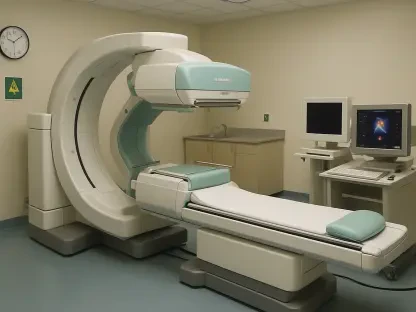Artificial Intelligence (AI) and cloud technology are revolutionizing various sectors, and healthcare is no exception. These technologies are not just futuristic concepts; they are already reshaping how healthcare providers operate, deliver care, and interact with patients. By harnessing the power of AI and cloud solutions, the healthcare industry is experiencing a tremendous shift towards more efficient, accurate, and patient-centered approaches. This article delves into how AI and cloud technology can transform modern healthcare, making it more efficient, accurate, and patient-centered.
Enhancing Operational Efficiency
AI tools have the capability to automate repetitive and routine tasks that often bog down healthcare professionals. For instance, administrative tasks like scheduling appointments, managing patient records, and billing can be handled more efficiently through AI systems. By automating these tasks, healthcare providers can focus more on patient care, which improves overall operational efficiency. Such automation not only speeds up administrative processes but also reduces the risk of human error, ensuring that patients receive timely and accurate services.
Moreover, AI can help in triaging patients by prioritizing those who need immediate attention based on their symptoms and medical history. This not only optimizes clinical workflows but also ensures that critical care is delivered promptly. AI-enabled chatbots and virtual assistants are increasingly playing a role in initial patient interactions, thus freeing up valuable time for healthcare professionals. By handling preliminary consultations and answering common patient queries, these AI tools allow doctors and nurses to dedicate more time to complex cases that require human expertise.
Significantly, these improvements in efficiency are not just limited to large hospitals but are also accessible for smaller clinics and healthcare centers. AI-driven platforms provide scalable solutions that can be customized according to the size and needs of the healthcare organization. Smaller healthcare facilities can thus benefit from the same level of technological advancement as their larger counterparts, ensuring a more uniform standard of care across the board. As a result, resources are better utilized, and the quality of patient care is significantly enhanced.
Elevating Patient Care Through Data Insights
AI’s ability to analyze large datasets is transforming patient care. Through advanced analytics, AI can offer valuable insights that aid in better decision-making. For example, predictive analytics can identify patients at risk of developing chronic conditions and suggest preventive measures accordingly. In this way, AI supports a shift from reactive to proactive healthcare, allowing for early intervention and more effective management of chronic diseases. This predictive capability is particularly valuable in managing public health, as it can help identify trends and prevent outbreaks of infectious diseases.
Personalized medicine is another area where AI is making a substantial impact. By analyzing individual patient data, AI can help create customized treatment plans that are more effective and have fewer side effects. This personalized approach enhances the quality of care and improves patient outcomes. For instance, AI algorithms can analyze genetic information to determine the most effective treatment options for cancer patients, thereby increasing the likelihood of successful outcomes. The ability to tailor treatments to individual patients represents a significant advancement in medical practice, moving towards more precise and efficient healthcare.
Furthermore, AI aids in diagnostic processes by analyzing medical images and identifying patterns that might be missed by the human eye. This not only speeds up diagnosis but also increases accuracy, leading to more effective treatments. Radiology, for example, has seen significant improvements with AI applications capable of detecting abnormalities in X-rays, MRIs, and CT scans with higher precision than traditional methods. By reducing the time required for diagnosis and increasing accuracy, AI helps healthcare providers offer timely and effective treatments, thus improving patient prognosis and overall healthcare quality.
Harnessing Cloud Technology for Scalability
AI operations in healthcare require substantial computing power, which is where cloud technology comes into play. Cloud platforms provide the necessary infrastructure to handle intensive AI applications, offering virtually unlimited storage and computational capacity. This scalability is particularly valuable for medical research institutions that deal with massive datasets. Researchers can leverage cloud resources to perform complex data analyses that would be impossible on traditional on-premises systems, fostering innovation and accelerating the pace of medical discoveries.
Cloud technology also facilitates seamless data sharing and collaboration among healthcare providers. This is crucial for multidisciplinary teams working on complex cases, as it allows for better coordination and informed decision-making. By hosting patient records and medical data on the cloud, healthcare organizations can ensure that relevant information is accessible to all necessary stakeholders in real time. This real-time accessibility enhances the efficiency of care delivery, ensuring that patients receive timely and coordinated care from different specialists, thereby improving overall patient outcomes.
Importantly, cloud solutions are cost-effective and can reduce the need for on-premises hardware, thereby lowering maintenance expenses. This financial advantage makes advanced technologies more accessible to smaller healthcare providers who may have limited budgets. By eliminating the need for significant upfront investments in IT infrastructure, cloud solutions democratize access to cutting-edge technology, allowing a broader range of healthcare providers to benefit from the efficiencies and capabilities of AI. Consequently, the healthcare industry can focus more resources on patient care rather than technology maintenance, leading to better health outcomes.
Implementing a Hybrid Cloud Strategy
While the full migration to the cloud might seem ideal, it is often impractical for many healthcare organizations due to the presence of legacy systems. A hybrid cloud approach, which combines on-premises infrastructure with cloud services, is increasingly being adopted. This strategy allows for the gradual integration of modern technologies while maintaining essential legacy systems. Hybrid cloud setups offer the flexibility needed to tailor technological solutions to the specific needs and constraints of each healthcare provider, making it a practical and scalable option.
Hybrid cloud setups are particularly beneficial for managing technical debt and ensuring a smooth transition to new technologies. They offer flexibility, enabling healthcare providers to use cloud resources for specific applications like data analytics while keeping sensitive data on-premises for security reasons. This approach allows healthcare organizations to take advantage of the best features of both worlds, leveraging cloud scalability for data-intensive tasks while ensuring that sensitive patient data remains adequately protected within existing on-premises systems. This dual approach ensures both technological advancement and compliance with stringent data security regulations.
Creating disaster recovery plans and research testing zones is often the first step in cloud adoption. This cautious approach ensures that healthcare organizations can safeguard critical data and evaluate the performance of cloud services before a full-scale implementation. By starting small, healthcare providers can assess the reliability and benefits of cloud solutions without risking essential operations. This phased approach allows for a controlled and safer transition, ensuring that any potential issues can be identified and addressed early in the process. It also provides healthcare organizations with the flexibility to scale their cloud adoption based on their evolving needs and resources.
Ensuring Security and Compliance
Security is a significant concern when dealing with sensitive healthcare data. Cloud providers are increasingly offering robust security measures to protect patient information from unauthorized access and cyber threats. However, healthcare organizations must also ensure that their internal security protocols are strong before transitioning to the cloud. This dual responsibility underscores the importance of a comprehensive security strategy that encompasses both cloud and on-premises environments, thereby ensuring that patient data remains secure throughout the entire system.
Compliance with regulations such as HIPAA (Health Insurance Portability and Accountability Act) is crucial. Cloud providers often offer services that meet these regulatory requirements, but healthcare organizations must perform due diligence to ensure complete compliance. This involves regularly updating and auditing security practices to align with the latest regulatory standards. Moreover, healthcare providers must ensure that any third-party services they use also comply with relevant regulations to avoid potential breaches of patient confidentiality and associated legal repercussions.
Multi-factor authentication, end-to-end encryption, and regular security audits are some of the measures that can enhance data security in both cloud and hybrid environments. By investing in robust security strategies, healthcare organizations can mitigate the risks associated with data breaches and maintain patient trust. These security measures not only protect patient data but also ensure the integrity and availability of critical healthcare systems, thereby supporting uninterrupted care delivery. In an increasingly digital healthcare landscape, robust security practices are essential for maintaining patient confidentiality, trust, and overall system integrity.
Collaborating with Technology Partners
AI and cloud technology are fundamentally transforming multiple industries, with healthcare being a prime example. These technologies are not distant, futuristic ideas; they’re actively reshaping how healthcare providers operate, deliver care, and communicate with patients. By leveraging AI and cloud solutions, the healthcare sector is moving towards more efficient, accurate, and patient-focused practices.
AI can analyze vast amounts of data at an unprecedented speed, leading to quicker diagnoses and personalized treatment plans. For instance, machine learning algorithms can sift through medical records to identify patterns that might be invisible to the human eye, thus aiding early disease detection. Similarly, AI-powered diagnostic tools can assist doctors in making more accurate decisions, enhancing the overall quality of care.
Meanwhile, cloud technology offers secure, scalable solutions for storing and sharing patient information. It facilitates real-time access to patient data for healthcare providers, improving coordination and reducing redundancies. This not only streamlines workflows but also ensures that patients receive timely and consistent care.
Together, AI and cloud technology are setting the stage for a new era in healthcare—one that prioritizes efficiency, precision, and patient-centered care. As these technologies continue to evolve, their integration into healthcare is likely to deepen, offering more innovative solutions and setting higher standards for the industry.









